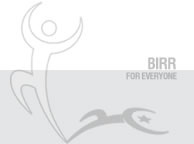
A. BIRR Engagement Strategy (10 points)

- Develop a greater understanding of the needs of Muslim youth-at-risk. We are gaining this skill by continuously engaging with Muslim youth in the southwest Sydney area
- Increase visibility with the media and at public events. BIRR has had some coverage in metropolitan newspapers. In addition we have used community events such as the Multicultural Eid Festival and Fair (15,000-20,000), the Sydney Eid Festival (7,000-10,000 attendees) and the FEZA Qurban Festival (7,000-10,000) to promote BIRR.
- Build Community Commitment. Community commitment is strengthening by better engagement with stakeholders such as schools and mosques who allow us to use their networks to promote the project. Presentations to senior high school students about creating a positive Australian Muslim identity, self-esteem, confidence, and better methods of engagement with the wider society are helping us build commitment to BIRR. Positive feedback from BIRR activity such as the sessions we are running at the BIRR office and the mentoring camps have also helped enhance the image of the partnership and thus the level of commitment towards it from the community.
- Recruit to the team. We are currently registering Muslim youth with BIRR. Our current list was built based on the community consultations we have had as well as through stakeholders and community networks. These youth are registering to become mentors and to join our mentoring training camps.
- Expand services to reach a wider audience. There will be a BIRR Radio Announcement going out to some community and commercial radio stations.
BIRR will also utilise this channel to provide on-air informative segments for the community.
- Use forums. We consulted with the NSW attendees of the National Muslim Youth Summit (2005) which was sponsored by the Department of Immigration and Citizenship. These contacts have being added to our list of registered Muslim youth.
- Run focus groups. We have been running focus groups consisting of 10-12 people at a time. The focus groups have been running at the BIRR office, and they generally go for about 1.5-2 hours. The points of discussion vary from general information about the BIRR project to specific questions that we ask the youth. These questions are similar in nature to the consultation questionnaires found on this website under the heading of ‘Questions for Muslim Youth’. Our researchers have found such focus groups useful.
- Attend sporting and recreational centres. BIRR personnel and volunteers have been visiting the PCYC (Police Citizens Youth Club) Bankstown to speak to Muslim youth and introduce them to BIRR and its centre. In addition, we have visited other local sporting clubs in southwest Sydney in order to reach out to the target community.
- Set consultation questionnaires for Muslim youth leaders, Muslim youth, and Muslim parents to aid BIRR with the consultation process. The questionnaires can be found on this website.
- Form an internal mailing list for those Muslim youth registered with BIRR. This aids in the better formation of a BIRR network. A group SMS list has also been formed to inform those registered with BIRR about internal activities, progresses, and events.

B. BIRR Guidelines to Stakeholder Engagement (10 points)
Stakeholders are those that have a vested interest in the partnership
- To raise community awareness about the plight of disenfranchised Muslim youth-at-risk through stakeholders who have a standing in the Australian community and in the welfare of Muslim youth
- Link through stakeholders into community events in order to promote the re-engagement of Muslim youth
- Identify with stakeholders common community goals and build ownership in the community for the project outcomes
- Market the project as the core community response to issues of disenfranchisement and extremism, in order to attract patronage, support, resources, and involvement from large sections of the community
- Clearly document roles and responsibilities
- Make project goals ‘transparent’
- Inform stakeholders on an ongoing basis about project progress and any issues arising
- Identify and engage ‘strategic’ people in the programme, not just interested people.
- Building on existing relationships – as more volunteers become involved, it becomes easier to attract new ones.
- Disseminate project information through stakeholder networks

C. Consultation Framework
C1. QUESTIONS FOR CONSULTATION WITH MOSQUE/SCHOOL LEADERS
The purpose of this questionnaire is to generate information that helps build a case study about the teaching of values and the prevention of extremism as related to the education of Muslim youth. This interview takes the form of a general discussion, focusing on the following areas:
1. MOSQUE/SCHOOL CONTEXT
- Location of the establishment
- A brief history of the establishment
- Current congregation/enrolments – number of members and other demographic characteristics
- Recent achievements and future challenges regarding Muslim youth
2. MUSLIM YOUTH EDUCATION
- Does the mosque/school have a particular policy/philosophy in relation to the teaching of true Muslim values and the prevention of extremism?
- How does this translate into practice within the community?
- How do you select your Imams/teachers?
- What factors currently foster/hinder the prevention of extremism in your establishment?
- What opportunities do the youth have to demonstrate the values they are taught?
- How are parents/community involved in the teaching of the youth?
3. COMMUNITY AND RESOURCES
- What resources do the Imams/teachers at your mosque/school use for their lessons when teaching values and warning against extremism?
- What resources does the establishment use to promote the contribution of Islam to Australian society?
- What resources are required but are not available at present to support the teaching of values and the warning against extremist ideology?
4. TEACHER TRAINING & DEVELOPMENT
- What, if any, spiritual/professional training and development have Imams/teachers experienced in relation to teaching values to foster positive identities and to prevent extremism?
- What additional spiritual/professional development is required to assist Imams/teachers in their work in this area?
5. QUALITY EDUCATIONAL PROGRAMS
- What processes have been established to ensure the quality of education at the establishment and the keeping out of unwanted elements from within your environment?
- How does this establishment evaluate its educational program? What action does the establishment take after completion of such evaluation?

C2. QUESTIONS FOR CONSULTATION WITH RELIGIOUS TEACHERS AND YOUTH LEADERS
The purpose of this questionnaire is to generate information that helps build a case study about the teaching of values and the prevention of extremism for Muslim youth. This interview takes the form of a general discussion, focusing on the following areas:
Centre can be a mosque or a school or a youth centre
1. MUSLIM YOUTH EDUCATION
- What do you consider to be the centre’s greatest strengths in values education and prevention of extremism?
- How does your centre teach values and warn against extremism?
- What factors currently hinder/foster the prevention of extremism in your centre?
- What opportunities do the youth have to demonstrate the values they are taught?
- How are parents/community involved in the teaching of the youths?
- In what ways does the centre promote the contribution of Islam to Australian society?
- What is your role in that process?
2. COMMUNITY AND RESOURCES
- What resources do you use for teaching values and preventing extremism?
- What resources does the centre use to promote the contribution of Islam to Australian society?
- What resources are required but are not available at present to support the teaching of values and the warning against extremist ideology?
- What links does the centre have with community leaders and how does this influence the teaching of Muslim youths?
4. TEACHER TRAINING & DEVELOPMENT
- What, if any, training and development have you experienced in relation to teaching values and preventing extremism? How was this undertaken?
- What additional professional development is required to assist you in your work in this area?
5. QUALITY PROGRAMS
- What processes have been established to ensure the quality of education at the centre and the keeping out of extremist elements from within the congregation?
- How does this centre evaluate its educational program? What action does the centre take after completion of such evaluation?

C3. QUESTIONS FOR CONSULTATION WITH MUSLIM YOUTHS
- Could you describe what a typical day at your school, mosque, or youth centre looks like?
- What activities have you participated in that teach about values such as harmony, justice, and tolerance?
- Why do you think these are important?
- Can you talk about ways that youth in this school or mosque demonstrate these values in your daily life?
- Have you had experience with teachers that promote hate and extremist attitudes? Did you feel intimidated?
- How well do you think the education of true Islamic values helps you to participate in broader Australian society?

C4. QUESTIONS FOR CONSULTATION WITH MUSLIM PARENTS
The purpose of this questionnaire is to generate information that helps build a case study about the education of Muslim youth. This interview takes the form of a general discussion, focusing on the following questions:
- How do you ensure that your kids are taught the religious education by trustworthy sources?
- What do you consider to be the best aspects of your child’s education that helps them live in Australian society?
- In what ways do you think schools and mosques can promote social community cohesion and values of tolerance?
- How well do you think the way this school or mosque teaches helps your children to participate in broader Australian society?
- What checks and balances do you have in place to ensure that your kids are not being influenced by extremist books or leaders?
IF YOU WISH TO TAKE PART IN OUR CONSULTATION PROCESS PLEASE FORWARD YOUR RESPONSES TO THE BIRR MANAGER AT info@birr.edu.au
|















